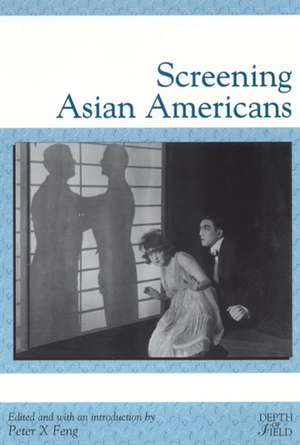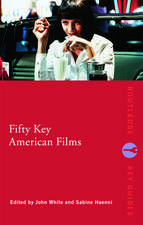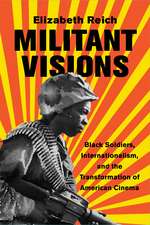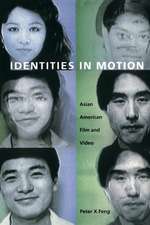Screening Asian Americans: Rutgers Depth of Field Series
Editat de Peter X Feng Contribuţii de Professor Sabine Haenni, Professor Eugene Franklin Wong, Professor Laura Hyun-Yi Kang, Professor Stephen Gong, Professor Rolando Tolentino, Professor Helen Lee, Professor Bill Nichols, Professor Marita Sturken, Professor Binita Mehta, Professor Linda Peckham, Professor Thomas Waugh, Professor Jennifer Guarino-Trier, Professor Mark Chiang, Professor Gayatri Gopinathen Limba Engleză Paperback – 2002
This innovative essay collection explores Asian American cinematic representations historically and socially, on and off screen, as they contribute to the definition of American character. The history of Asian Americans on movie screens, as outlined in Peter X Feng’s introduction, provides a context for the individual readings that follow. Asian American cinema is charted in its diversity, ranging across activist, documentary, experimental, and fictional modes, and encompassing a wide range of ethnicities (Filipino, Vietnamese, Indian, Japanese, Korean, Chinese, and Taiwanese). Covered in the discussion are filmmakers—Theresa Hak Kyung Cha, Ang Lee, Trinh T. Minh-ha, and Wayne Wang—and films such as The Wedding Banquet, Surname Viet Given Name Nam, and Chan is Missing.
Throughout the volume, as Feng explains, the term screening has a twofold meaning—referring to the projection of Asian Americans as cinematic bodies and the screening out of elements connected with these images. In this doubling, film representation can function to define what is American and what is foreign. Asian American filmmaking is one of the fastest growing areas of independent and studio production. This volume is key to understanding the vitality of this new cinema.
Throughout the volume, as Feng explains, the term screening has a twofold meaning—referring to the projection of Asian Americans as cinematic bodies and the screening out of elements connected with these images. In this doubling, film representation can function to define what is American and what is foreign. Asian American filmmaking is one of the fastest growing areas of independent and studio production. This volume is key to understanding the vitality of this new cinema.
Preț: 292.50 lei
Nou
Puncte Express: 439
Preț estimativ în valută:
56.02€ • 57.72$ • 46.93£
56.02€ • 57.72$ • 46.93£
Carte tipărită la comandă
Livrare economică 22 februarie-08 martie
Preluare comenzi: 021 569.72.76
Specificații
ISBN-13: 9780813530253
ISBN-10: 0813530253
Pagini: 320
Ilustrații: 1
Dimensiuni: 152 x 229 x 18 mm
Greutate: 0.51 kg
Ediția:None
Editura: Rutgers University Press
Colecția Rutgers University Press
Seria Rutgers Depth of Field Series
ISBN-10: 0813530253
Pagini: 320
Ilustrații: 1
Dimensiuni: 152 x 229 x 18 mm
Greutate: 0.51 kg
Ediția:None
Editura: Rutgers University Press
Colecția Rutgers University Press
Seria Rutgers Depth of Field Series
Notă biografică
PETER X. FENG teaches English and women's studies at the University of Delaware.
Cuprins
Acknowledgments
Introduction
Asian American Bodies
Filming "Chinatown": Fake Visions, Bodily Transformations
The Early Years: Asians in the American Films Prior to World War II (excerpt, with a new introduction)
The Desiring of Asian Female Bodies: Interracial Romance and Cinematic Subjection
Histories of Asian American Cinema
A History in Progress: Asian American Media Arts Centers, 1970-1990
Identity and Difference in "Filipino/a American" Media Arts
A Peculiar Sensation: A Personal Genealogy of Korean American Women's Cinema
Asian American Film and Video in Context
Historical Consciousness and the Viewer: Who Killed Vincent Chin?
The Politics of Video Memory: Electronic Erasures and Inscriptions
Being Chinese American, Becoming Asian American: Chan is Missing
Emigrants Twice Displace: Race, Color, and Identity in Mira Nair's Mississippi Masala
Surname Viet Given Name Nam: Spreading Rumors & Ex/Changing Histories
Good Clean Fung
"From the multitude of narratives...For another telling for another recitation": Constructing and Re-constructing Dictee and Memory/all echo
Coming Out into the Global System: Postmodern Patriarchies and Transnational Sexualities in The Wedding Banquet
On Fire
Contributors
Index
Introduction
Asian American Bodies
Filming "Chinatown": Fake Visions, Bodily Transformations
The Early Years: Asians in the American Films Prior to World War II (excerpt, with a new introduction)
The Desiring of Asian Female Bodies: Interracial Romance and Cinematic Subjection
Histories of Asian American Cinema
A History in Progress: Asian American Media Arts Centers, 1970-1990
Identity and Difference in "Filipino/a American" Media Arts
A Peculiar Sensation: A Personal Genealogy of Korean American Women's Cinema
Asian American Film and Video in Context
Historical Consciousness and the Viewer: Who Killed Vincent Chin?
The Politics of Video Memory: Electronic Erasures and Inscriptions
Being Chinese American, Becoming Asian American: Chan is Missing
Emigrants Twice Displace: Race, Color, and Identity in Mira Nair's Mississippi Masala
Surname Viet Given Name Nam: Spreading Rumors & Ex/Changing Histories
Good Clean Fung
"From the multitude of narratives...For another telling for another recitation": Constructing and Re-constructing Dictee and Memory/all echo
Coming Out into the Global System: Postmodern Patriarchies and Transnational Sexualities in The Wedding Banquet
On Fire
Contributors
Index
Recenzii
Cover to cover, Screening Asian Americans, a collection of 15 essays, is fabulous.
This scholarly book uses 15 contributors to explore the various images of Asians, many of which have been negative.
Descriere
This innovative essay collection explores Asian American cinematic representations historically and socially, on and off screen, as they contribute to the definition of American character. The history of Asian Americans on movie screens, as outlined in Peter X. Feng’s introduction, provides a context for the individual readings that follow. Asian American cinema is charted in its diversity, ranging across activist, documentary, experimental, and fictional modes, and encompassing a wide range of ethnicities (Filipino, Vietnamese, Indian, Japanese, Korean, Chinese, and Taiwanese). Covered in the discussion are filmmakers—Theresa Hak Kyung Cha, Ang Lee, Trinh T. Minh-ha, and Wayne Wang—and films such as The Wedding Banquet, Surname Viet Given Name Nam, and Chan is Missing.
























